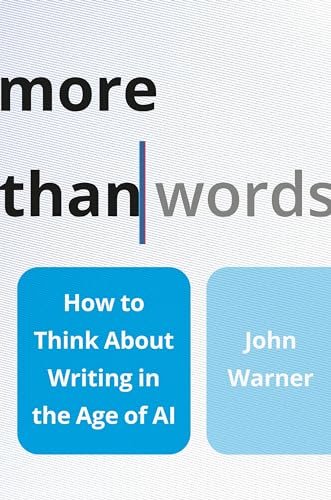
30 May Book Review of More Than Words: How to Think About Writing in the Age …
More Than Words: How to Think About Writing in the Age of AI by Warner – A Thought-Provoking Exploration
As an avid reader and passionate advocate for the craft of writing, I often find myself caught in the whirlwind of discussions about technology’s impact on our lives. When I stumbled upon More Than Words: How to Think About Writing in the Age of AI by Warner, I felt an immediate pull—this was a conversation I desperately wanted to be a part of. With his years of experience as a college writing instructor, Warner brings an essential perspective to a topic that feels increasingly relevant, especially as generative AI blurs the lines between creativity and computation.
Warner’s examination of generative AI is not just a critique of technology but a heartfelt plea to recognize what it means to truly write. He opens with an important point that resonated with my own thoughts: “artificial intelligence” might be a catchy term, but calling it what it is—automation—captures its essence accurately. AI may churn out text, but it lacks the human qualities that define the writing experience: thought, emotion, and voice. Warner argues persuasively that using AI in writing represents a denial of the very processes that make us human. I couldn’t help but think of students leaning on AI to craft their papers—much like those who rely solely on workout videos to get fit. It’s a tempting shortcut, but ultimately, you miss out on the growth that comes from the struggle.
Diving into Warner’s narrative made me appreciate the depth of his inquiry. He’s not just waving a flag of caution; he’s urging a reflexive examination of our relationship with technology. The stark warning about the billionaires and corporate interests behind AI was sobering. The environmental implications of building huge AI infrastructures in rural areas, especially concerning water supply, were eye-opening. It’s a reminder that the repercussions of our technological advancements often extend far beyond their immediate benefits.
The structure of Warner’s arguments flows seamlessly, transitioning from critique to actionable advice organized under the resonant themes of “Resist,” “Renew,” and “Explore.” Each section felt like a personal conversation, urging not just contemplation but action. His simple yet powerful analogy about the danger of inaction reminded me of our current political landscape—if we just sit idly by, we may find ourselves facing overwhelming consequences.
Warner has a knack for striking memorable quotes that linger long after reading. One that particularly stood out was, “If writing is thinking and feeling, then generative AI is a specter of what we could lose.” These words not only encapsulate his warnings but also reflect a profound truth about writing as a deeply human journey.
In conclusion, More Than Words is a vital read for anyone involved in education, writing, or simply those curious about the implications of AI in our everyday lives. Warner’s insights challenge us to reflect on our practices and confront the dilemmas posed by emerging technologies. Personally, this book has invigorated my passion for writing and has reminded me of the importance of maintaining our human touch in a world that increasingly favors automation. If you love the craft of writing or are a teacher navigating this new landscape, give yourself the gift of reading Warner’s work—it might just change the way you think about writing in the age of AI.
Discover more about More Than Words: How to Think About Writing in the Age … on GoodReads >>









